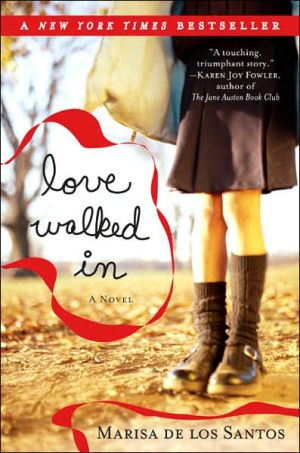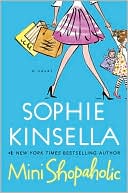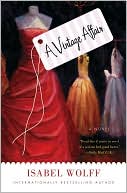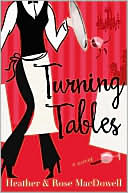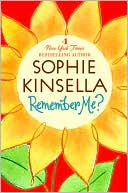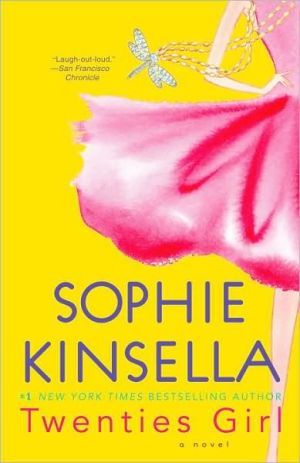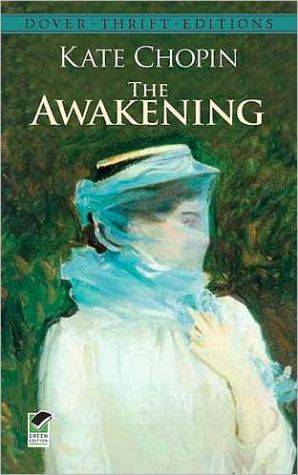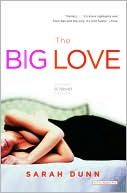Love Walked In
When Martin Grace enters the hip Philadelphia coffee shop Cornelia Brown manages, her life changes forever. But little does she know that her newfound love is only the harbinger of greater changes to come. Meanwhile, across town, Clare Hobbs—eleven years old and abandoned by her erratic mother—goes looking for her lost father. She crosses paths with Cornelia while meeting with him at the café, and the two women form an improbable friendship that carries them through the unpredictable currents...
Search in google:
A tribute to classic film and true romance, Love Walked In tells the story of two women one older, one younger and the unexpected ways in which their lives are forever changed by chance.For thirty-one-year old Cornelia Brown, life is a series of movie moments, and "Jimmy Stewart is always and indisputably the best man in the world, unless Cary Grant should happen to show up." So imagine Cornelia's delight when her very own Cary Grant walks through the door of the hip Philadelphia café she manages. Handsome and debonair, Martin Grace sweeps Cornelia off her feet, becoming Cary Grant to Cornelia's Katharine Hepburn, Clark Gable to her Joan Crawford. Meanwhile, on the other side of town, eleven-year-old Clare Hobbes must learn to fend for herself after her increasingly unstable mother has a breakdown and disappears. With no one to turn to, Clare seeks out her estranged father, and when the two of them show up at Cornelia's café, the lives of Cornelia and Clare are changed in drastic and unexpected ways. A cinematic and heartfelt debut that pays homage to the classic Cary Grant/Katharine Hepburn romantic comedy The Philadelphia Story, Love Walked In is sure to win over critics and readers of contemporary fiction.The Washington Post - Susan AdamsLove Walked In by Marisa de los Santos, is the kind of book that makes you want to hunker down on a chilly day in a comfy chair and read straight through 'til dark. The beginning is light, entertaining and inviting, the middle grows more serious, and then, toward the end, the violins really start to play in this poignant, heart-tugging story about a single woman and a little girl who develop an unlikely bond.
Love Walked In\ \ By Marise de los Santos \ Dutton Adult\ ISBN: 0-525-94917-8 \ \ \ Chapter One\ Cornelia \ My life-my real life-started when a man walked into it, a handsome stranger in a perfectly cut suit, and, yes, I know how that sounds. My friend Linny would snort and convey the kind of multipronged disgust I rely on her to convey. One prong of feminist disgust at the whole idea of a man changing a woman's life, even though, as things turned out, the man himself was more the harbinger of change than the change itself. Another prong of disgust for the inaccuracy of saying my life began after thirty-one years of living it. And the final prong being a kind of general disgust for the way people turn moments in their lives into movie moments.\ I do this more than I should, I'll give her that, but there was something backlit and sudden about his walking through the door of the cafe I managed. If the floor had been bare and not covered with tables, chairs, people, and dogs, the autumnal late-morning sun would have slung his narrow shadow dramatically across the floor in a real Orson Welles shot. But Linny can jab me with her three-pronged disgust fork all she wants, and I'd still say that my life started on that October morning when a man walked through the door.\ It was an ordinary day-palpably ordinary, if that makes any sense, like it was asserting its smooth usualness. A Saturday, loud, smoke already piling up and hovering like weather over me and the customers in Cafe Dora. I sat where I always sat when I wasn't waiting on someone-on a high stool behind the counter-and I watched Hayes and Jose play chess. Everyone said they were good players. They themselves said they were. "Not prodigy good," said Hayes. "Not Russian, Deep-freakin'-Blue-playing good. But hell." Hayes was from Texas and wrote the wine column for the Philadelphia Inquirer. He liked to swear in offbeat ways, liked to walk in, turn a chair around backward with a bang, and straddle it.\ As I watched, Jose lifted his shaggy head, gave Hayes a liquid-eyed, sorrowful look, and moved a chess piece from one square to another. I don't know the game well, but whatever Jose had done, it must have been something, because Hayes tossed back his head and hooted, "Hot damn, boy! You pulled that one right out of your ass!" Hayes looked at me with a wry smile and a genial cowboy twinkle in his eye, and I lifted one corner of my mouth in a kind of rueful facial shrug. "What can you do?" my face said.\ But don't get attached to Hayes. As he was already in the room, he's obviously not the man who walked into it bearing the new life on his shoulders, and he doesn't finally figure into this story much. Not sure why I started with Hayes, except that in lots of ways he's a neat little embodiment of the old life: a self-invented, smartish, semialluring wine snob disguised as a cowboy, not un- nice, with fairly amusing comments tripping off his tongue and probably a real person under there somewhere, but possibly not. In college, I read Piers Plowman in which this man Will goes on a journey and runs into characters like Holy Church and Gluttony. Think of Hayes as a character like that: Typical-Denizen-of-Cornelia's-Old-Life. I've always found allegories kind of comforting. When you encounter people named Liar and Abstinence, you might not be crazy about them, but you know exactly what you're getting into.\ Another regular, Phaedra, made her entrance, all blowsy auburn curls, leather pants, and nursing-mother breasts, and tugging a giant black pram behind her-one of those English nanny prams with high, white rubber tires. Five people jumped up and nearly cracked one another's skulls trying to hold the door open for her. Phaedra directed a beseeching look at the couple sitting at the table nearest the door, a look that turned out to be unnecessary. The man and woman were already hustling up their cappuccinos, jackets, camera bags, and backpacks on metal frames, not minding a bit.\ "Cornelia!" Phaedra sang at me across the room in just the sort of musical voice you'd expect to come out of her mouth. "Could you? Cafe au lait? Loads of sugar? And something sinful!" We don't have table service. Phaedra made a helpless, sighing gesture with her shoulders and her long hands, indicating her child, her exhaustion, the whole ancient weight of motherhood. Phaedra was a pain. But Allegra was a different story. Bearing the coffee and a croissant, I came out from behind my counter and made my zigzag way around tables and dogs for the sake of Phaedra's baby, Allegra.\ And there she was, wrapped in a leopard-print blanket, just waking up. A blue-eyed, translucent, bewitching witch of a baby, fresh as new bread in that smoky room. Allegra resembled Phaedra, same white skin, same glorious Carole Lombard forehead, but with carrot-orange hair that flew out in all directions. I waited for the pang; the pang came. I never saw Allegra without wanting to touch her, specifically to sleep with her in the crook of my right arm. I put the croissant and the coffee in front of Phaedra, then cradled my elbows with my hands. Allegra was asleep and making nursing motions with her mouth because what else would babies dream about?\ "Face it. You want one," said Phaedra. With effort, I shifted my gaze from gorgeous child to gorgeous pain-in-the-ass mother. "See that?" said Phaedra. "You had to literally drag your eyes away from her." Ouch, I thought, and then sat down to talk for a minute, Phaedra's misuse of the word "literally" having created a warm spot in my heart, tiny but large enough to prompt a five- minute conversation.\ "How's business?" I asked. Phaedra was a jewelry designer.\ "Not good. I'm starting to think people just don't get it," said Phaedra. Her signature pieces, or what would be her signature pieces if anyone bought and wore them, were made out of sea glass and platinum, a juxtaposition of the ordinary and extraordinary, Phaedra claimed, that forced one to rethink one's perceptions of "value" and "preciousness." Maybe people didn't get it. Or maybe they got it but didn't feel sufficiently moved to shell out eight hundred dollars for a bracelet made of old Heineken bottles.\ Phaedra lifted her coffee to her lips, eyeing me brightly through the steam. "Cornelia, what if you wore some of the pieces in the cafe, just to generate interest?" Her tone suggested the idea had just popped into her head. In fact, this was the third time she'd asked.\ "I can't wear jewelry at work," I said, not elaborating but rolling my eyes in a way I hoped suggested some unseen powers-that-be who hovered over me, forbidding jewelry. The truth was that I never wore jewelry anywhere, ever. I'm five feet tall and built like a preteen, eighty-five pounds soaking wet, as my father says, and my fear is that, given my smallness, jewelry will make me look like a geegaw or doodad, a spangly ornament to hang on a tree. It's a shame, too, because I adore it. Not so much Phaedra's kind-cool, angular objects-but serious jewels: diamonds, cuffs and chokers, brooches like shooting stars, tiaras. Jean Harlow jewels, Irene Dunne on the ship in Love Affair.\ Allegra stirred in her leopard-print nest, yawned, and shot out a fist. Phaedra lifted her onto her lap, instantly dipping her swan neck, dropping her face into the orange hair, breathing in her child's scent. An authentic gesture, automatic, unstudied. I felt prickles shoot down my arms. I touched a finger to Allegra's hand, and she gripped it hard and hung on.\ "You should have one, you know," said Phaedra, harping, and this instantly got my hackles up, until I saw her face, which was something like kind. Phaedra was always a better person with Allegra in her arms. So I just trilled a little laugh and said, breezily, "Me with a baby. Can you imagine?"\ "Of course, I can. Perfectly," said Phaedra. "And so can you."\ While I resented her smug smile, and while I'd have died before admitting it to her, I had to admit to myself that she was at least partly right: I couldn't imagine it perfectly, but I could imagine it. Had imagined it, in fact, more than once. But, every time, what brought me to my senses was my conviction that before a person dropped a new life into this world, she should probably get a real one herself.\ The truth was, I was treading water and had been for some time. If you're wondering why a thirty-something woman who had gone to all the trouble of attending a university and slogging through medieval allegorical texts had risen no higher on the career food chain than cafe manager, I don't blame you. I wondered myself. And the best answer I'd come up with was that I hadn't figured out anything better-not yet. If I were to ever have a full-fledged vocation, as opposed to a half-assed avocation, I needed to love it and, in my experience, it isn't always easy to figure out what you love. You'd think it would be, but it isn't. Also, if you stay in it for any length of time, like anyplace else, a cafe becomes a world.\ I felt suddenly weary, looking at Phaedra and Allegra and the shining black pram. And if a woman weighing less than ninety pounds can be said to heave herself, I heaved myself out of my seat and lugged myself back to my spot behind the bar.\ All of which is meant to demonstrate the ordinariness of the day and how the ordinariness was even taking on shades of dreariness and futility. Because you have to understand what my life was like in the "before" in order to see just how much it changed in the "after." Ordinary, ordinary. Except that-and I honestly believe this, Linny's pooh-poohing of movie moments notwithstanding-just before, a minute before the cafe door opened one more time, the ordinary day turned itself up a notch, in preparation.\ The light falling through the high, arched windows went from mellow to brilliant, turning the old copper of the espresso machine to pure gold. And the music-Sarah Vaughan, whom I worship, singing George and Ira, whom I worship-was suddenly floating and dipping like some kind of bird in the clear space above the cigarette smoke and chitchat. The coffee smelled sublime, the flowers I'd bought that morning pierced the air with their blueness, the coffee cups lost their chips and glowed eggshell-thin, and standing in my red sweater and vintage suede skirt, my boots solidly on the floor, I felt almost tall.\ The door of Cafe Dora opened, and Cary Grant walked in.\ If you haven't seen The Philadelphia Story, stop what you are doing, rent it, and watch it. It's probably overstating the point to say that until you watch it, you will have been living a partial and colorless life. However, it is definitely on the list of perfect things. You know what I mean, the list that includes the starry sky over the desert, grilled cheese sandwiches, The Great Gatsby, the Chrysler building, Ella Fitzgerald singing "It Don't Mean a Thing (If You Ain't Got That Swing)," white peonies, and those little sketches of hands by Leonardo da Vinci.\ If you have seen it, then you know there's a moment when Katharine Hepburn as Tracy Lord steps from a poolside cabana. She's got a straight white dream of a dress hanging from her tiny collarbones, a dress fluted and precise as a Greek column but light and full of the motion of smoke. A paradox of a dress, a marriage of opposites that just makes your teeth hurt it's so exactly right.\ I was fourteen when I first saw it. It was three days before Christmas, which in my family's house meant, means, and will always mean, Yuletide sensory overload: every room stuffed to the gills with garland and holly, the whole place booming with Johnny Mathis, and a monstrosity of a tree towering in the living room, weighed down with ornaments of every description, including dozens defying description that my brothers, sister, and I had made in school over the years.\ Fourteen was not a good year for me. I was the latest of late bloomers, of course, about two feet high and scrawny as a cat, still shopping in the children's department, profoundly allergic to every member of my family, and convinced that nothing could make me happy. But then my grouchy channel-surfing landed me in the middle of a black-and-white heaven: Tracy, the dress.\ I was so struck, I forgot how to swallow and began to truly asphyxiate on a sip of 7-Up. And when, a little later, Tracy unfastened the belt from her willow waist and slipped her faultlessly formed self out of that faultlessly formed garment, I stood up and yelled, "Holy shit, that's her bathing suit cover-up!" which my father, who was sitting on the floor fastening-no joke-jingle bells to the collars of our cats, did not appreciate.\ I turned every atom of myself over to the rest of the movie. People must've gone tearing through the room, because people always did go tearing through rooms, especially my brothers Cam and Toby, who were eight and nine at the time. But a volcano could have begun spewing molten rock inches away from me, and I would not have noticed. I sat. I watched. If a girl could sling a poem over her swimwear as though it were an old T-shirt, what else might be possible?\ I slid my fingers over my face, feeling for Tracy's winged cheekbones. And when Dexter (Cary Grant) took Tracy to task, saying, "You'll never be a first-rate woman or a first-rate human being until you have some regard for human frailty," I recognized it as wisdom and wondered whether I had it, that kind of regard, and just how to get it if I didn't.\ In college, I took a film studies class subtitled something like "Turning the Formula on Its Head" in which the professor talked about the trick The Philadelphia Story pulls off. It should never have worked: creating a fantastic love scene between two characters whom you know are not in love with each other, getting you somehow to root for them wholeheartedly during the scene, but then to feel completely satisfied when they end up with other people.\ Before you get the wrong impression, you should know that I'm not and never was one of those film people, the kind who argue into the wee hours about the auteur theory and whether Spielberg is the new Capra, or whether John Huston impacts, in unseen ways, every second of American life. I don't know from camera angles, and I don't have an encyclopedic knowledge of pre-World War II German cinema, but I fell a little in love with the film professor when he looked upon us with shining eyes and proclaimed, "No, it should not work. But work it does!" because he was so passionate and right.\ When I heard Mike (Jimmy Stewart) say to Tracy in that tender, marveling voice, "No, you're made out of flesh and blood. That's the blank, unholy surprise of it. You're the golden girl, Tracy," I clasped my hands under my pointy chin, prayed that she would run away with him, and swore to God that someday a man would say those words in that voice to me or else I would die. But then, at the movie's end, my father heard cheering and left water running in the sink to watch his lately distant, disaffected teenage daughter bang her fists on the arms of her chair and turn to him crying, "with a face as open as a flower" (my dad's own improbable words), saying breathlessly, "She's marrying Dexter, Daddy."\ I'll admit it. I've always been more than a little proud of myself for having been fourteen and deeply benighted about almost everything, but having had the sense to recognize what is surely a universal truth: Jimmy Stewart is always and indisputably the best man in the world, unless Cary Grant should happen to show up.\ His name was Martin Grace. An excellent name, which, you may have noticed, shares all but three letters with "Cary Grant." Of course, if you're not a freak of nature, you probably didn't notice, and you'll be relieved to know that it didn't even spring to my mind right away. It was later, as I lay in bed that night, that I figured it out, mentally crossing out letters with an imaginary pencil, concentrating pretty hard, but sort of affecting an offhand, semi-interested attitude about it, cocking my head casually on the pillow, even though there was no one in the room to see me.\ Truth be told, I'm a little superstitious about names. Back in college, I dated an enormous, blond, dumb fraternity boy from Baton Rouge with a voice like a foghorn purely on the strength of his being named William Powell, whom everyone knows from the Thin Man movies, but who is even better in Libeled Lady and is one of those men whose handsomeness you believe in completely even though you know it doesn't exist.\ My mother met the boy and knew instantly what I was up to. "Your nose looks like Myrna Loy's," she'd said. "Be satisfied with that." Even so, I didn't ditch Bill until a few nights later when I stood in his Georgian-mansion-turned-dank-cave of a frat house and watched Bill dancing shirtless on a tabletop, his bare, unfortunate belly pulsating like an anguished jellyfish. The bellyfish pulsated, and William Powell, with a delicate shrug, chose that moment to detach himself from Bill forever and slip out into the honeysuckle-scented night.\ Slippery things, names. Still: Martin Grace. Good. Very good.\ (Continues...)\ \ \ \ \ Excerpted from Love Walked In by Marise de los Santos Excerpted by permission.\ All rights reserved. No part of this excerpt may be reproduced or reprinted without permission in writing from the publisher.\ Excerpts are provided by Dial-A-Book Inc. solely for the personal use of visitors to this web site. \ \
\ From Barnes & NobleBarnes & Noble Discover Great New Writers\ Bogart and Bacall, Hepburn and Tracy. Their romances and their films have stirred the hearts and minds of movie buffs for decades and have set the bar high. But movies aren't like life…or are they? Marisa de los Santos' debut novel is a delicious modern-day fairy tale come true that's not only a captivating love story but a heartfelt homage to some of our favorite films, too. \ \ Cornelia Brown is a 30-ish café manager: underemployed, alone, and hardly expecting to star in her own version of The Philadelphia Story. Yet that, remarkably, is just what happens when Martin Grace walks through the door. For a woman who measures life in terms of her favorite movie moments, this has Hollywood written all over it. Meanwhile, across town, young Clare Hobbes is living a nightmare. Forced to fend for herself when her unstable mother suffers a breakdown, and unable to convince her estranged father to respond to her pleas for help, she is alone and terrified. Oh, the drama! \ \ So put your feet up, shoo the dog off the couch, and prepare for an extraordinary ride to a world where Cary Grant, Katharine Hepburn, and Jimmy Stewart set the standard; where an appealing, big-hearted heroine finally learns all about love; and happily-ever-after, though perhaps with some surprises, is finally given its due. (Spring 2006 Selection)\ \ \ \ \ Susan AdamsLove Walked In by Marisa de los Santos, is the kind of book that makes you want to hunker down on a chilly day in a comfy chair and read straight through 'til dark. The beginning is light, entertaining and inviting, the middle grows more serious, and then, toward the end, the violins really start to play in this poignant, heart-tugging story about a single woman and a little girl who develop an unlikely bond.\ —The Washington Post\ \ \ Publishers WeeklyPhiladelphia cafe manager Cornelia Brown drifts effortlessly through her unattached life, unapologetic for idealizing romance and breathlessly recommending The Philadelphia Story-to the reader and everyone else. Eleven-year-old Clare is a child of divorce whose mother, a successful party planner, is quickly going to pieces. In alternating chapters of Cornelia's first person and Clare's free and direct third, poet de los Santos, making her novel debut, tells the story of their finding each other. That Cornelia, early on, immediately falls for Cary Grant doppelganger Martin Grace is no surprise; his relation to Clare, revealed a third of the way in, isn't really either. As she discovers maternal instincts she wasn't sure she had, Cornelia works up the courage to face her own feelings for Clare with honesty. As Martin exits, Cornelia's childhood friend Teo enters, but neither makes much impact, and Clare's rather serious issues get reduced to Clare-did-this, Clare-thought-that episodes. The two main characters exist for one purpose: to enact a cross-generational, strong-but-vulnerable-and-loving, screenplay-ready femininity. Chick lit? You bet: with rights sold in at least eight countries, and, indeed, to Paramount-Sarah Jessica Parker will star and coproduce with Sideways's Michael London. The book is fine, but for this property, it's a case of waiting for Carrie to walk in. (Jan.) Copyright 2005 Reed Business Information.\ \ \ \ \ Children's LiteratureCornelia would be the first to admit that she has turned her life into a series of movie moments. She moved to Philadelphia because she fell in love with a movie—The Philadelphia Story—and there she waits for her leading man. When Martin, the handsome stranger in a perfectly cut suit, opens the door of the coffee shop Cornelia manages, she is all too ready to be swept off her feet and into the arms of her Cary Grant, her Clark Gable, her Jimmy Stewart. But is Martin her real love? Will he be the one to transform her fantasies into reality? Across town, eleven-year-old Clara struggles to hold her life together as her mother becomes increasingly unstable. When her mother disappears, abandoning Clara on the side of a road, Clara turns to her estranged father for help. And when Clara and her father show up on Cornelia's doorstep, Clara's and Cornelia's lives are changed forever. This is a novel about love between men and women, friends and strangers, mothers and daughters. There are a few (very few) obscenities, and the intimate moments between some of the characters are discrete. A choice for older teenage girls although many—if not most—will not be familiar with the leading men and the romantic movies of the past. 2006, Penguin, Ages 15 up. \ —Anita Barnes Lowen\ \ \ \ \ Library JournalCornelia is a sprightly little thing who's stuck in a rut managing a coffee shop and watching her beloved film classics in her spare time. Then, right out of the movies, "love walked in," looking just like a modern-day incarnation of Cary Grant. Martin seems to be perfect for Cornelia, until she meets his ten-year-old daughter, Clare, whom he had failed to mention. When Cornelia learns that Clare's mother, Martin's ex-wife, has disappeared, she steps right into the situation. Narrated by Cornelia and Claire in alternating chapters, this is the story of how two lives intersect and a great relationship blooms from an unexpected seed. Poet de los Santos's debut is a light, sweet read with just a bit of substance underneath. Sarah Jessica Parker is slated to star and coproduce the film version with Sideways producer Michael London, and it seems like a good match. This may be one of those books that will be even better on the big screen. Recommended. [See Prepub Alert, LJ 8/05.]-Beth Gibbs, Davidson, NC Copyright 2005 Reed Business Information.\ \ \ \ \ Kirkus ReviewsTwo heroines, Clare Martin and Cornelia Brown, discover the power of friendship and the meaning of love in this remarkable tale. De los Santos crafts two irresistible characters in her debut novel. First we meet Cornelia, a hopeless romantic, addicted to classic films in which dashing men like Carey Grant bedazzle glamorous leading ladies like Grace Kelly. Cornelia is a 30-something underachiever whiling her time away as the manager of a Philadelphia coffee shop. While she neglects her interior life, Cornelia keeps her intellect sharp by engaging in clever repartee with the eccentrics who patronize Cafe Dora. But everything changes when Martin Grace strolls through the cafe's door. Martin is matinee-idol perfect-the witty banter, the impeccable clothes, the air of mystery. Cornelia is hooked. The relationship whizzes along, bringing Cornelia an offer of marriage. But before she gets to live happily ever after, Cornelia delves deeper into her feelings for Martin. Is she willing to settle for a safe and reliable relationship with a weak physical and emotional connection? Maybe chemistry only exists on movie screens and sparks don't fly for mere mortals. As Cornelia struggles to find her romantic bearings, our other heroine is facing tragedy. Clare, a tenderhearted pre-teen, is devastated when her mother experiences a mental breakdown and abandons Clare during the holidays. Through serendipity, Clare and Cornelia cross paths at the cafe, and the author deftly interweaves their stories. These two fragile souls instinctively cling to one another and share their dreams. Clare longs for a safe and secure home life and a reunion with her mother; Cornelia hopes to create a family of her own andfind love. De los Santos's writing engages throughout this powerful story. It's impossible not to cheer for these characters as they search for happiness. A timeless gem. Film rights to Paramount, with Sarah Jessica Parker to star and, with Michael London, co-produce\ \
